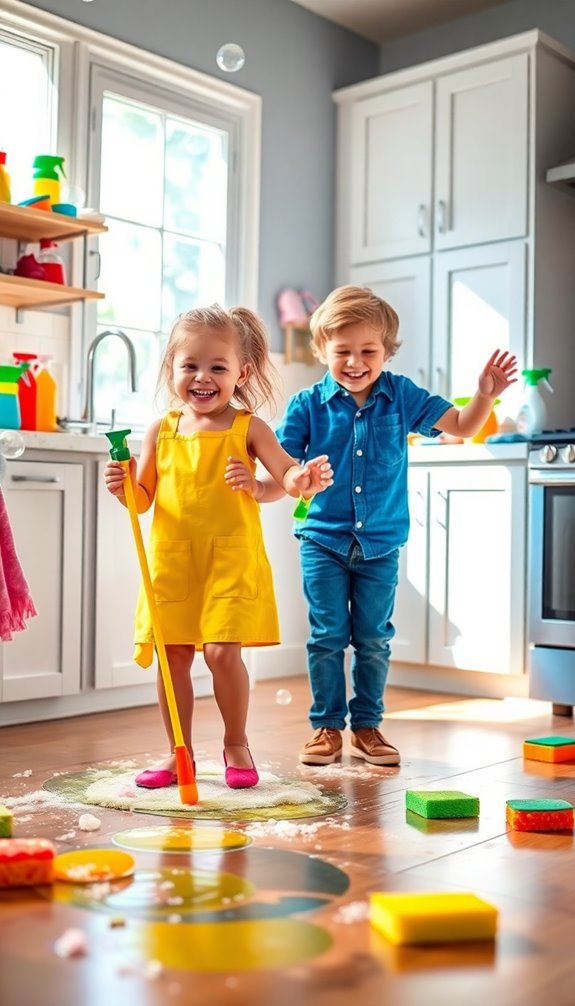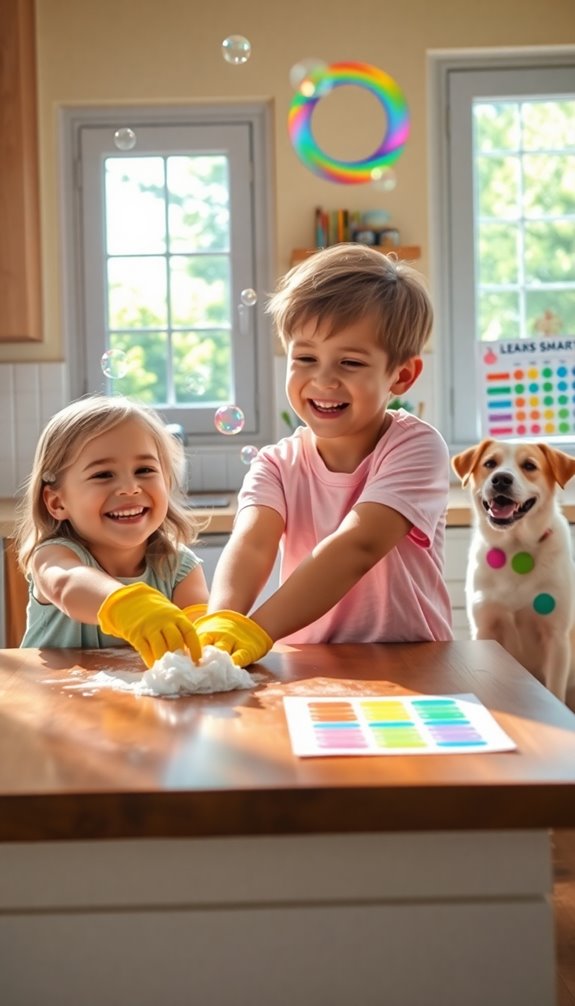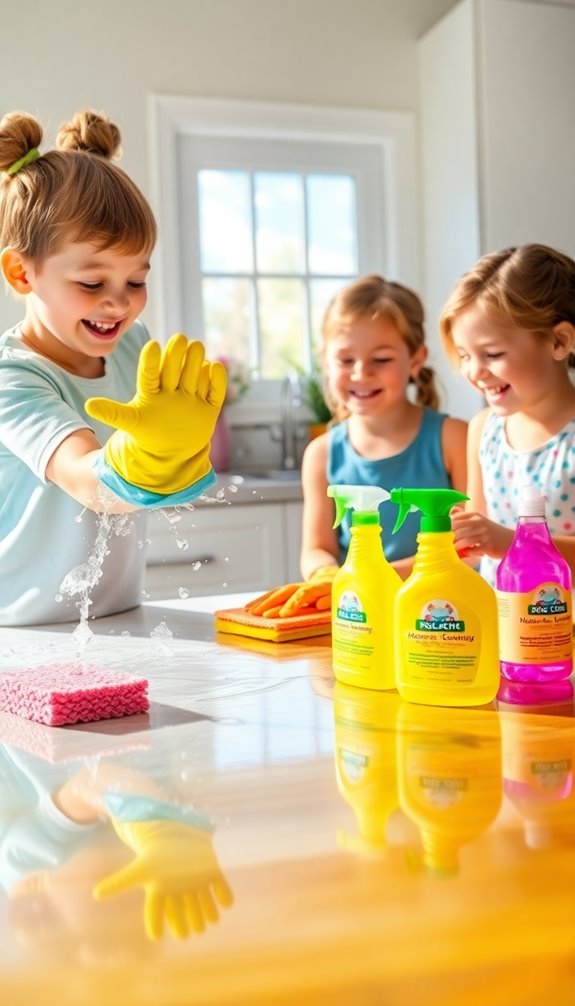Involving your kids in cleaning is a great way to teach them responsibility and essential life skills. Start with age-appropriate tasks, like having toddlers pick up toys or older kids dust surfaces. Make cleaning fun by turning it into a game—use songs or timers to create a lively atmosphere. Positive reinforcement, like praise and small rewards, can motivate them to participate. Also, opt for safe, non-toxic cleaning products to keep the environment secure and educational. With these tips, you can transform cleaning into an enjoyable family activity while instilling valuable organization skills. There's so much more to explore!
Importance of Involving Kids
Involving kids in cleaning chores is important for their development. You might be surprised to learn that only 28% of parents ask their children to help out with household chores. This lack of involvement can lead to gaps in significant life skills by the time kids reach adulthood. Engaging your children in cleaning tasks fosters a sense of responsibility and accountability, which are fundamental traits they'll carry into the future. Regular participation in such activities can also promote time management skills that are essential for balancing responsibilities as they grow. Additionally, teaching children the importance of proper disinfection helps them understand hygiene and health, which are key aspects of a safe living environment.
When kids contribute to cleaning, they also enhance their self-esteem and confidence. Completing chores gives them a sense of accomplishment and a feeling of being part of the family team. Starting as early as age 2, kids can develop enthusiasm for chores and learn important organizational habits that benefit them for life. Moreover, research shows that those who participate in household cleaning are more likely to develop effective time management and organizational skills. These life skills prepare them for the independence they'll need as they grow older. Additionally, involving kids in chores can help them adopt time-saving strategies that will benefit their busy lifestyles in the future.
Age-Appropriate Cleaning Tasks
When it comes to cleaning, assigning age-appropriate tasks can make all the difference.
Toddlers can start with simple chores like picking up toys, while preschoolers can tackle setting the table and unloading the dishwasher. Involving kids in cleaning routines also helps them understand the value of time-saving techniques that can make chores more efficient. Teaching children to maintain a clutter-free environment fosters a sense of responsibility and helps them appreciate the importance of organization.
As kids grow, you can introduce more complex tasks, ensuring they develop essential life skills along the way. For example, involving children in seasonal cleaning tasks teaches them the importance of maintaining a clean and organized home throughout the year.
Toddler Tasks Overview
Teaching toddlers about cleaning can be a fun and rewarding experience for both you and your little one. At ages 2-3, they're ready to engage in simple cleaning tasks that not only keep your home tidy but also foster a sense of responsibility.
Start by turning clean-up time into a fun activity. Encourage them to pick up toys and sort items, helping them develop essential organizational skills.
You can also teach your kids basic cleaning techniques by allowing them to wipe spills with a damp cloth. This not only reinforces their ability to contribute but also builds their confidence in handling small chores.
Another great task is placing dirty clothes in a designated hamper, which illustrates the importance of cleanliness and organization in their environment.
Preschooler Responsibilities Explained
As toddlers gain confidence in their cleaning skills, preschoolers are ready to take on more responsibilities around the house. Engaging in cleaning with kids not only develops their organizational skills, but it also fosters a sense of ownership over their space.
Here are some age-appropriate household tasks for preschoolers:
- Setting the Table: Let them place plates, utensils, and cups, making mealtime special.
- Sorting Laundry: Teach them to separate colors from whites, turning it into a fun matching game.
- Unloading the Dishwasher: Show them how to put away safe items, building their confidence in helping out.
- Making Their Beds: Encourage them to pull up blankets and arrange pillows, instilling pride in their personal space.
Break tasks into manageable steps to avoid overwhelming them and reinforce the habit of immediate cleanup after activities.
Consistent involvement in these preschooler responsibilities boosts their self-esteem as they achieve small accomplishments in their daily routines. By encouraging these tasks, you're helping them develop essential skills while making cleaning a fun and structured activity.
Elementary Chores Suggestions
Elementary-aged children, typically between 7 and 9 years old, are ready to tackle more significant cleaning tasks that foster their growing sense of responsibility. You can assign them chores like sweeping floors, setting the table, and sorting laundry, which align with their developing motor skills.
As they gain confidence, involve them in more complex tasks such as dusting surfaces and vacuuming. These activities promote independence and help them learn essential life skills.
Establishing a chore routine is key. Create a chore chart that visually outlines each child's responsibilities, making it easier for them to manage their cleaning time. This visual aid enhances accountability and helps kids understand the importance of their contributions to the household.
Encouraging teamwork during these cleaning tasks can be a game-changer. Consider family cleaning days, where everyone pitches in together. Not only does this make cleaning more enjoyable, but it also teaches children the value of collaboration and shared responsibilities.
Making Cleaning Enjoyable

Here's a game plan to make cleaning fun for your kids:
- Cleaning Games: Create games like Clean Your Room BINGO or scavenger hunts. It turns tidying up into an exciting activity that keeps kids motivated. Incorporating daily cleaning routines can also help them understand the importance of maintaining a tidy space. To further enhance their cleaning experience, use non-toxic cleaners that are safe for children, ensuring a healthy environment as they participate.
- Play a Cleaning Playlist: Use a playlist of your kids' favorite songs while they clean. This lively atmosphere can energize the process and encourage participation.
- Set Timers: Introduce a timer for each task. Children will enjoy racing against the clock, which also helps them develop time management skills.
- Establish a Rewards System: Offer points for completed tasks that can be traded for treats or privileges. This reinforces positive behavior and motivates consistent participation.
Incorporating these elements not only helps kids clean but also fosters a sense of responsibility while making cleaning enjoyable. Additionally, involving children in cleaning tasks can enhance their understanding of age-appropriate tasks and instill lifelong cleaning habits.
You'll be surprised how much they'll engage in their chores!
Organization Skills for Kids
Teaching your kids organization skills is essential for their independence and responsibility. Start with age-appropriate tasks, like sorting toys or laundry, to make organizing fun and manageable. Incorporate storage bins and baskets to help them categorize their belongings effectively. Additionally, using creative shelving systems can encourage kids to take ownership of their space and keep it tidy. You can also encourage them to regularly reassess their belongings to prevent clutter accumulation and maintain an organized environment.
Importance of Organization Skills
Organization skills are essential for kids as they navigate their daily lives and prepare for future challenges. By teaching your children these skills, you're instilling a sense of responsibility and accountability that's fundamental for their success.
When kids actively engage in cleaning and organizing their belongings, they develop significant abilities that will benefit them academically and personally.
Here are some key reasons why organization skills are important:
- Improved Time Management: Kids learn to plan their activities and allocate time effectively.
- Enhanced Problem-Solving: Organizing requires kids to categorize and prioritize their items, fostering critical thinking.
- Boosted Self-Esteem: Completing organizing tasks gives kids a sense of accomplishment, which builds their confidence.
- Lifelong Habits: Early exposure to cleaning and organizing leads to a structured and productive lifestyle.
Age-Appropriate Organizing Tasks
As kids develop their organization skills, it's important to introduce tasks that match their age and abilities. For toddlers (ages 2-3), you can start with simple organizing tasks like putting away toys and sorting items by color or size. This fosters early organizational skills.
Preschoolers (ages 4-5) can take on setting the table, sorting laundry, and making their beds, helping them understand designated spaces for items.
As your child enters early elementary (ages 6-8), they can handle more complex tasks, like dusting surfaces and organizing their books or toys. This practice not only enhances their tidiness but also teaches categorization.
For kids aged 9-12, encourage them to change sheets and organize their study areas, reinforcing responsibility and the value of a clean environment.
To make it easier for all ages, consider implementing a visual chore chart. This tool helps kids to clean by tracking their organizing tasks and creates a sense of accomplishment as they complete each one.
Positive Reinforcement Strategies

Often, using positive reinforcement can make a world of difference when it comes to getting kids involved in cleaning tasks. By applying these strategies, you can motivate your children and foster a sense of accomplishment:
- Praise Efforts: Acknowledge your child's efforts with specific praise. Let them know how much you appreciate their hard work.
- Implement a Rewards Chart: Create a visual rewards chart to track completed chores. This tangible recognition encourages them to stay engaged.
- Offer Small Incentives: Provide incentives like extra screen time or a special treat for completing tasks. This reinforces their contributions and makes cleaning feel rewarding.
- Celebrate Success: After tasks are completed, celebrate as a family. Whether it's a fun activity or a simple gathering, this builds self-esteem and encourages pride in their cleaning efforts. Additionally, when you involve kids in cleaning, you teach them age-appropriate tasks that will help develop their responsibility. Furthermore, using eco-friendly cleaning products ensures a safe environment while teaching children about sustainability.
Consistent use of positive reinforcement not only motivates children but also helps develop their responsibility and work ethic over time. Additionally, engaging in cleaning together can enhance employee productivity by instilling a sense of teamwork and shared accomplishment.
When you work together and celebrate these moments, you're instilling values that will last a lifetime.
Family Cleaning Activities
Family cleaning activities can transform tedious chores into enjoyable experiences that strengthen bonds among family members. Scheduling regular cleaning days encourages collaboration and helps everyone develop teamwork skills. When you assign specific tasks to each person, it creates a sense of responsibility and guarantees that everyone contributes to maintaining a clean home.
Engaging in group cleaning activities fosters camaraderie among kids and adults alike, making chores feel less burdensome. To make it even more fun, consider implementing a points system or rewards for completing tasks. This little twist can motivate participation and turn cleaning into a game, making it a more enjoyable experience for everyone involved.
After finishing your cleaning tasks, celebrate your accomplishments with a family gathering or a fun activity. This reinforces the importance of teamwork in household responsibilities and strengthens your family bonds.
Safe Cleaning Products

Cleaning the home shouldn't just be fun; it should also be safe, especially when kids are involved. You want to guarantee that the cleaning products you use are non-toxic and child-friendly.
Here are some tips to keep your cleaning sessions safe and enjoyable:
- Choose Safe Cleaning Products: Opt for eco-friendly brands or make your own using natural ingredients like vinegar and baking soda. These are effective and safe for kids.
- Create a Cleaning Playlist: Music can make cleaning feel like a party! Curate a fun playlist that keeps the energy up while everyone cleans.
- Use Cleaning Gloves: Teach your kids to wear cleaning gloves. This practice not only protects their hands but also makes them feel like they're real helpers.
- Involve Kids in DIY: Let your children participate in making DIY cleaning solutions. It's a great way for them to learn about safe cleaning practices while having fun.
Overcoming Resistance to Cleaning
Getting kids on board with cleaning can feel like a formidable task, but it doesn't have to be. Start by framing cleaning as an opportunity for cleaning fun. Instead of viewing it as an imposition on their playtime, show them how enjoyable it can be. Use age-appropriate tasks that match their developmental capabilities to make cleaning more manageable and less intimidating.
Establishing consistent routines helps prepare your kids mentally. Repetition reinforces acceptance, making it easier for them to engage in chores over time. Incorporate playful elements by turning cleaning into games, such as timed challenges or scavenger hunts, to shift their perception from chores to enjoyable activities.
Don't forget the power of positive reinforcement. Praise your children for their efforts and recognize small achievements with rewards. This acknowledgment not only motivates them to participate but also fosters a sense of responsibility.
Conclusion
Involving your kids in cleaning isn't just about tidying up; it's a chance to bond and build important life skills. Imagine turning chores into fun adventures rather than dreaded tasks—who wouldn't prefer a cleaning dance party over a silent scrub? By using age-appropriate tasks, safe products, and a sprinkle of positive reinforcement, you'll create a home where everyone shares the load. So, let's make cleaning a family affair and watch your kids thrive!